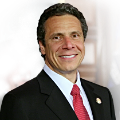- By Dan Veaner
- News
 Print
Print  Andrew CuomoGovernor Andrew Cuomo announced Wednesday that New York's $142 billion budget had been passed Cuomo claimed that the budget exemplifies fiscal discipline by staying below 2% of additional spending, while addressing key issues in education and ethics.
Andrew CuomoGovernor Andrew Cuomo announced Wednesday that New York's $142 billion budget had been passed Cuomo claimed that the budget exemplifies fiscal discipline by staying below 2% of additional spending, while addressing key issues in education and ethics."This $142 billion budget is the most meaningful that we have agreed to in many years, not because of what we are spending but because of how we are spending it," Cuomo said. "We are not just maintaining services and the status quo with this budget. We are investing in a new future for our state."
But educators are wary of the new budget, which imposes new standards, training and accountability on educators while still not restoring the Gap Elimination Adjustment (GEA) which has deducted promised state aid from districts state-wide for nearly a half dozen years.
Lansing Superintendent says that the projected $800,000 budget gap the Board Of Education must close for the 2015-16 budget wouldn't exist at all if the GEA were eliminated.
"When we look at our difference, it's that $800,000 that we're owed for the GEA," she said. "If that were fully restored it would make a huge difference in our budget. Right now that will not be coming to us if the full reform agenda is not approved by legislators."
Lansing's representatives in Albany both supported bills to get rid of the GEA, but, again this year, that did not happen. Additional funding was restored, but Albany continues to short school districts. Pettograsso says that approximately $350,000 has been restore to the upcoming Lansing budget, but the district is still out $450,000.
Cuomo raised school spending by what he called a landmark six percent increase, raising state funding of schools to a record-high $23.5 billion. But he tied the money to compliance with Albany mandated reforms that include teacher evaluation, certification, and providing new authority to improve failing schools.
The State will offer full scholarships to top students who agree to teach in new York for five years. Albany will also introduce a graduate education accreditation program that gives the State Education Department (SED) the authority to close programs that do not prepare student teachers adequately.
Teachers will now have to complete 100 hours of training every five years and pass a state 'teacher bar' exam to maintain their licenses in good standing. Cuomo wants tenure to be linked to performance, not time in service, and extend the probationary period to four years, as well as instituting merit bonuses to top performing teachers. Ineffective teachers will face a single officer rather than a panel in hearings that will be required after three 'ineffective' ratings. The budget also allots $395 million to expand pre-K programs.
The big mandate is Cuomo's teacher evaluation system, which some educators are saying unfairly connects student performance to teacher performance. The United Federation of Teachers has fiercely lobbied against the plan, claiming that the new policies would drive teachers away from working with high-needs students, whose lower performance could also bring down a teacher's rating. New York State United Teachers (NYSUT) also oppose Cuomo's 'reforms'.
"The governor is misinformed. New York has one of the strongest public education systems in the nation and a professional, highly dedicated teaching force," said NYSUT President Karen E. Magee in January. "Governor Cuomo should be celebrating that excellence. Instead we get intellectually hollow rhetoric that misrepresents the state of teaching and learning. Students, parents and teachers, who know better, aren't buying this agenda, which everyone knows is driven by the governor's billionaire hedge-fund friends. The truth is, there's no epidemic of failing schools or bad teachers. There is an epidemic of poverty and under-funding that Albany has failed to adequately address for decades. Nearly 1 million New York schoolchildren - including more than one-third of African-American and Latino students - live in poverty. The state's systemic failure to provide enough resources for all of its students and to do so equitably - while giving all teachers the tools and support they need - is the real crisis and the one our governor is trying to sweep under the rug."
Even supporters of the Governor were somewhat reticent about this year's budget process, which was marred by the resignation of Assembly Speaker Sheldon Silver on federal charges in January that he accepted almost $4 million in kickbacks. Silver was expected to oppose Cuomo on education issues. Some educators and political opponents have also charged that the budget process under Cuomo has been hidden behind closed doors.
"Governor Cuomo and the Legislature deserve credit for adopting a timely budget," said New York State Comptroller Thomas P. DiNapoli. "Still, it is unfortunate that this year's budget process was not more transparent. My office will analyze and report on the enacted budget in detail, including its impact on the state's debt and out-year finances."
The bottom line is that while schools will receive more dollars this year, they will only get half of what they believe the state owes them. In addition, new mandates will have to be paid for out of local district budgets, further chipping away at dollars educators say they would rather spend on actual education.
v11i13



